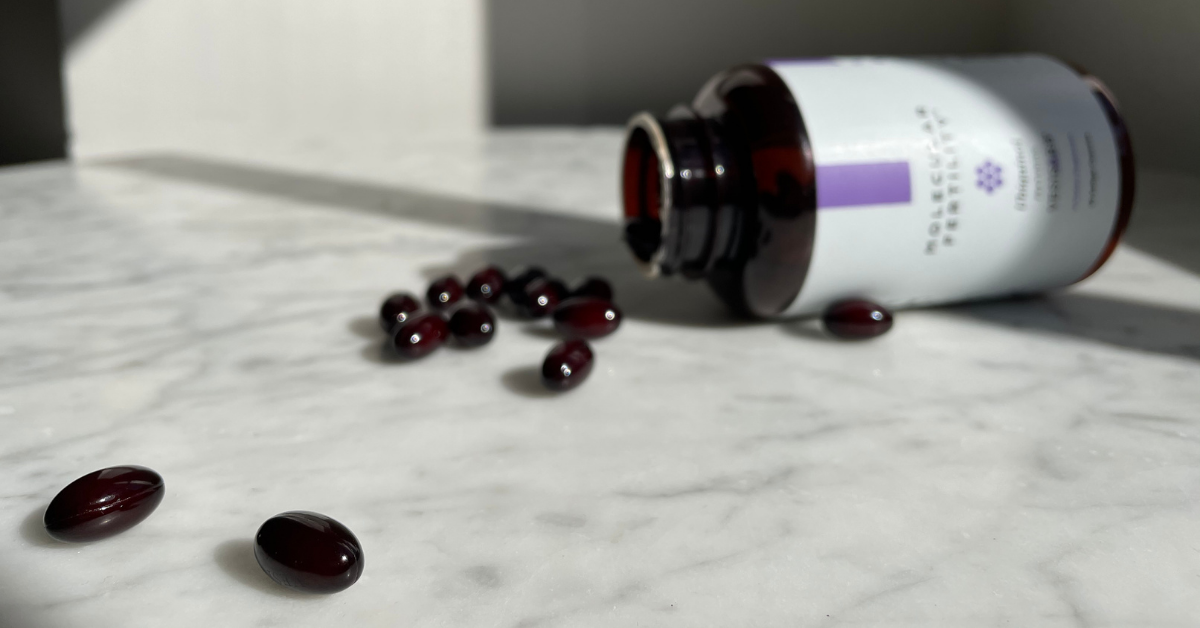CoQ10 and Sperm Health
We discuss various nutrients and dietary supplements in this article that may or may not be helpful. If you purchase recommended products, services, or treatments, it may benefit CNY Fertility financially. Read more about our financial relationships here. The supplements discussed in this article are not intended to treat, cure, or prevent any disease. If you are pregnant, take any medications, or have been diagnosed with a medical condition, consult with a healthcare provider before taking any dietary supplement.

Coenzyme Q10 (CoQ10) is a vitamin-like substance that has been shown to have many positive impacts on sperm parameters and overall male fertility. CoQ10 has strong antioxidant activity and provides energy to cells. In humans, it commonly exists in two forms coenzyme Q10 (ubiquinol) and ubiquinone-10 (ubiquinone.)
In this article, we are going to discuss all things related to CoQ10 and sperm health and how CoQ10 may increase male fertility. However, before we get into the specifics of how CoQ10 supports sperm health, let’s briefly discuss a few common measures of sperm health that are measured during a semen analysis along with the types of CoQ10.
Sperm Motility: Motility is the ability of sperm to move the right way.
Sperm Count: The number of sperm present in a semen sample.
Sperm Concentration: Also known as sperm density, is the number of sperm per milliliter of semen.
Spermatic DNA Fragmentation: A measure of the change in the bases or physical breaks in one or both of the DNA strands of the chromosomes within the sperm.
Sperm Morphology: The size, shape, and appearance of sperm.
The chart below depicts normal semen analysis results according to the World Health Organization (WHO).
| Measure | WHO Reference Range |
| Total Motility | 40-81% |
| Total Sperm Count | 39-928 million |
| Concentration | 15-259 million per mL |
| Fragmentation | >15% |
| Morphology | 4-48% |
As for the types of CoQ10 one is likely to encounter, CoQ10 commonly exists in two forms in our blood, ubiquinol and ubiquinone.
Ubiquinone: The oxidized and biologically inactive form. Must go through enzymatic activation to be biologically active. Still beneficial and slightly less expensive.
Ubiquinol: The reduced and biologically active form. 90% of blood CoQ10 exists in this form. Ubiquinol also has much better absorption but is more expensive.
Both forms have been shown to be helpful for fertility, though ubiquinol may be preferred.
CoQ10 and Sperm Motility
Research has shown that CoQ10 supplementation helps improve sperm motility levels. Researchers believe that Co Q10’s ability to improve motility is due to its antioxidant properties and its contribution to cell energy production.
In one study, men aged 20-40 supplemented with CoQ10 supplements for 6 months. Sperm parameters were tested before and after the 6-month of supplementation. Researchers found that CoQ10 significantly increased total sperm motility and the number of rapidly motile sperm. CoQ10 supplementation also decreased the number of sluggish motile sperm and non-motile sperm.
The total sperm motility was increased by 26% after CoQ10 supplementation.

The quantity of rapidly motile sperm increased 41%.

The number of sluggish motile sperm decreased 29%, and, as displayed in the figure below, the non-motile sperm count decreased up to 55%.

CoQ10 and Motility Summary
Studies have indicated that CoQ10 can help to improve men’s sperm motility from below average to at or above normal levels. CoQ10’s potential ability to increase sperm motility is important for male fertility because sperm need to move through the woman’s reproductive tract to reach and fertilize her egg.CoQ10 and Sperm Count/Concentration
CoQ10 has also been shown to have a significant positive impact on sperm count and concentration. A high sperm count is important for several reasons, and a low sperm count can be a sign of several underlying health conditions. Low sperm count is also frequently associated with poor sperm quality. A high sperm count increases the chance that sperm will reach and fertilize the woman’s egg and also reduces the chance that the resulting conception will carry a disorder.
In the study referenced above that measured CoQ10 and sperm motility, researchers also measured total sperm count. After 6 months of CoQ10 supplementation, the total sperm count increased by 53% along with sperm concentration.

Several other studies including a meta-analysis have further supported the notion that CoQ10 can help to improve sperm count and concentration significantly.
CoQ10 and DNA Fragmentation
Sperm DNA fragmentation can be caused by several different factors, including infections, smoking, pollutants, and more. However, researchers believe that oxidative stress is the major cause of sperm DNA fragmentation. CoQ10 thought to support male fertility in part due to its strong antioxidant properties. Antioxidants neutralize free radicals and help protect the body from oxidative stress. As such, researchers have designed studies to test the effects of CoQ10 therapy on semen parameters, oxidative stress markers, and sperm DNA fragmentation.
In one study, men were supplemented with 200 mg of CoQ10 for three months. They tested participants’ seminal plasma CoQ10, total antioxidant capacity, total reactive oxygen species, and SDF levels before and after CoQ10 supplementation. After three months of supplementation, reactive oxygen species levels and sperm DNA fragmentation levels were also reduced compared to baseline levels.
As such, researchers concluded that CoQ10 supplementation could help improve semen parameters, oxidative stress markers and reduce sperm DNA fragmentation.
Other studies have produced similar findings indicating that CoQ10 and its antioxidant properties can help to fight off reactive oxygen species that negatively impact male fertility and increase sperm DNA fragmentation.
CoQ10 and Sperm Morphology
Abnormal sperm morphology can decrease fertility and decrease the chances of successful fertilization. For example, sperm can have a misshaped head, an extra head, no head, or no tail. Decreased sperm morphology can have many causes, including genetic traits, exposure to chemicals, and too much heat. CoQ10’s antioxidant properties help to protect sperm from oxidative stress and other types of degradation that can harm sperm morphology.
In the study from 2019 mentioned above where researchers gave men either 200mg or 400 mg of CoQ10 they also measured sperm morphology before and after supplementation. The group who supplemented with 200 mg of CoQ10 saw a modest improvement in sperm morphology from 22.17% to 23.64%. The 400 mg group saw a slightly greater improvement from 24.64% to 27.41%. It is worth noting that even prior to supplementation both groups’ motilities were within the WHO’s range for normal.

While certainly not as drastic as some of the other measures of sperm health, other studies have produced similar results and led researchers to conclude that CoQ10 may have a positive effect on sperm morphology.
The Best CoQ10 for Sperm Health
Our team of doctors, endocrinologists, and fertility specialists at CNY Fertility created Molecular Fertility, our own line of supplements specifically designed to help support fertility. Molecular Fertility offers CoQ10 Ubiquinone or Ubiquinol supplements; or for a more robust male fertility supplement, look no further than Male Preconception+, which contains CoQ10 and a host of other nutrients designed to help support sperm health.

Molecular Fertility CoQ10 supplements utilize a patented technologically advanced VESIsorb® delivery system which has been shown to significantly increase CoQ10 absorbtion and bioavailability. One study showed VESIsorb® delivery system improves peak blood levels of CoQ10 by 696% and the relative bioavailability by 485%.
Summary of CoQ10 on Sperm Health
CoQ10 (Coenzyme Q10) is a co-enzyme that plays a critical role in cellular energy production and displays strong antioxidant properties that protect sperm from oxidative stress and other factors that can negatively influence sperm parameters.
Many studies have confirmed the positive effects of CoQ10 on sperm health. Because of this, many fertility specialists recommend CoQ10 to support and improve sperm count, motility, and other aspects of male reproductive health.
May your sperm be healthy and mighty, and possibly, with a little helping hand from CoQ10!




